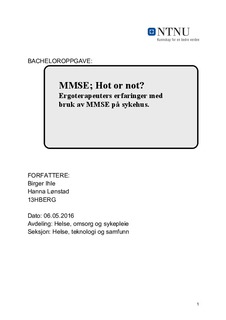| dc.contributor.advisor | Stigen, Linda | |
| dc.contributor.author | Ihle, Birger | |
| dc.contributor.author | Lønstad, Hanna | |
| dc.date.accessioned | 2016-08-31T12:22:12Z | |
| dc.date.available | 2016-08-31T12:22:12Z | |
| dc.date.issued | 2016-08-31 | |
| dc.identifier.uri | http://hdl.handle.net/11250/2403139 | |
| dc.description.abstract | Bakgrunn: MMSE er det mest brukte redskapet for kartlegging av kognitiv funksjon verden over (Van Heugten m. fl. 2014). MMSE er kortvarig å administrere, og har spørsmål om tid- og stedsorientering, hukommelse, hoderegning, språk og praksis (Folstein m. fl. 1975). MMSE har ulike påvirkingsfaktorer og begrensninger ved utførelse av redskapet og benyttelse av resultatet (Strobel og Engedal 2008). Vi ønsker å undersøke hvilke erfaringer ergoterapeuter har med MMSE, og hvordan de løser problemstillinger rundt bruken av redskapet. Metode: Kvalitativ metode med fokusgruppeintervju ble gjennomført med fire ergoterapeuter som jobber på sykehus. Intervjuet ble transkribert og analysert med bruk av innholdsanalyse. Resultat: Ergoterapeutene benytter MMSE i stor grad, og finner redskapet brukervennlig og nyttig ved retesting. De nevner flere begrensninger som kan påvirke MMSE-resultatet. Dette kan være høy alder, utdanningsnivå, kulturell bakgrunn, stress, sykdom og fysiske funksjonsnedsettelser. De opplever en ulik forståelse og benyttelse av MMSE-skår mellom forskjellige yrkesgrupper, og nevner verdien av en helhetlig kognitiv vurdering. Ergoterapeutene mener at MMSE ikke skal brukes isolert, fordi generalisering til ADL-funksjon kan variere i stor grad. Konklusjon: Resultatene indikerer at MMSE er et mye benyttet verktøy for screening av kognitiv funksjon. Det er tidseffektivt, enkelt å administrere og er velkjent i fagmiljøet. Verktøyet har dog flere begrensninger som kan påvirke resultatet, og det vil være viktig å overveie disse for å iverksette hensiktsmessige tiltak. Det kan tyde på at forståelsen av MMSE er ulik for forskjellige yrkesgrupper når kvalitativ informasjon blir kvantifisert. Det vil være viktig å inkludere den kvalitative informasjonen for å få en helhetlig vurdering av kognitiv funksjon. | nb_NO |
| dc.description.abstract | Objective: MMSE is the most widely used tool for cognitive assessment (Van Heugten m. fl. 2014). The MMSE is quick to administer, and includes questions about time and place orientation, memory, mental arithmetic/mathematics, language and practice (Folstein m. fl. 1975). MMSE has different influencing factors and constraints in carrying out the assessment and use of the results (Strobel og Engedal 2008). Our goal was to examine the experiences occupational therapists have with use of the MMSE, and how they solve questions regarding the assessment tool. Methods: Qualitative method with focus group interview was conducted with four occupational therapists working in a hospital. The interview was transcribed and analysed using content analysis. Results: The occupational therapists use the MMSE frequently, find it easy to administer, and useful in retesting. They mention several limitations affecting the MMSE results, such as old age, level of education, cultural background, stress, disease and physical impairment. They experience a difference in understanding and interpretation of the MMSE score between health professions, and mention the value of a wide-ranging cognitive evaluation. The occupational therapists believe that the MMSE should not be used isolated, as generalization to ADL function can vary largely. Conclusion: The results indicate that the MMSE is a widely used tool for screening of cognitive function. It is time efficient, easy to administer and is well known among health professionals. Nevertheless, the assessment tool does have some limitations affecting the results, which are important to take into account in order to implement appropriate interventions. The results imply that health professionals may understand the qualitative information differently when it is quantified. Therefore, it is important that the qualitative information that MMSE provides is included. | nb_NO |
| dc.language.iso | nob | nb_NO |
| dc.subject | Mini-Mental State Examination | nb_NO |
| dc.subject | Cognitive assessment | nb_NO |
| dc.subject | Occupational therapy | nb_NO |
| dc.subject | Hospital | nb_NO |
| dc.subject | Qualitative Method | nb_NO |
| dc.subject | Mini mental status evaluering | nb_NO |
| dc.subject | Kognitiv kartlegging | nb_NO |
| dc.subject | Ergoterapi | nb_NO |
| dc.subject | Sykehus | nb_NO |
| dc.subject | Kvalitativ Metode | nb_NO |
| dc.title | MMSE; Hot or not? Ergoterapeuters erfaringer med bruk av MMSE på sykehus. | nb_NO |
| dc.title.alternative | MMSE; Hot og not? Experiences using the MMSE by occupational therapists working in hospital. | nb_NO |
| dc.type | Bachelor thesis | nb_NO |
| dc.subject.nsi | VDP::Medical disciplines: 700::Health sciences: 800::Occupational health: 809 | nb_NO |
| dc.source.pagenumber | 39 | nb_NO |
